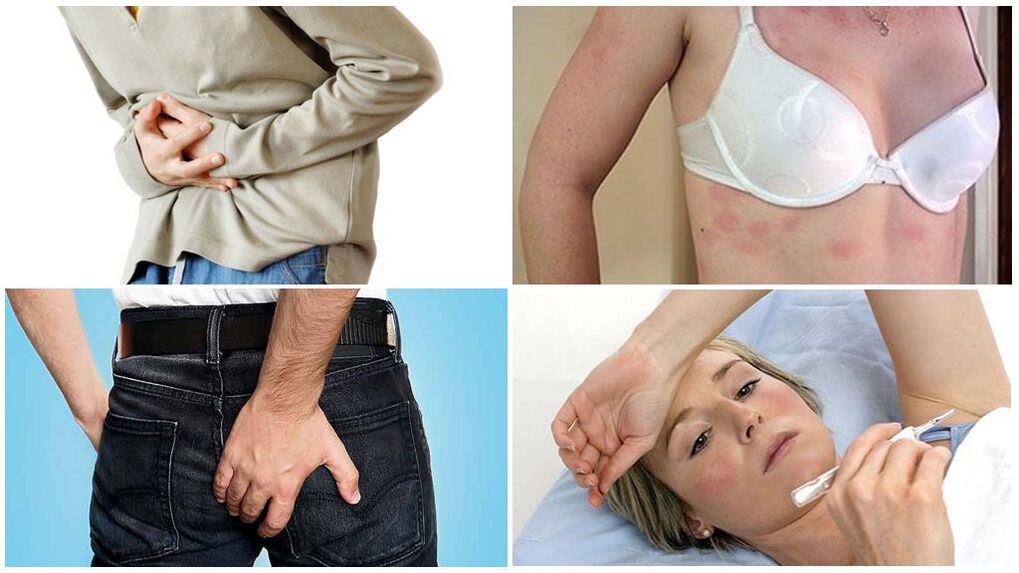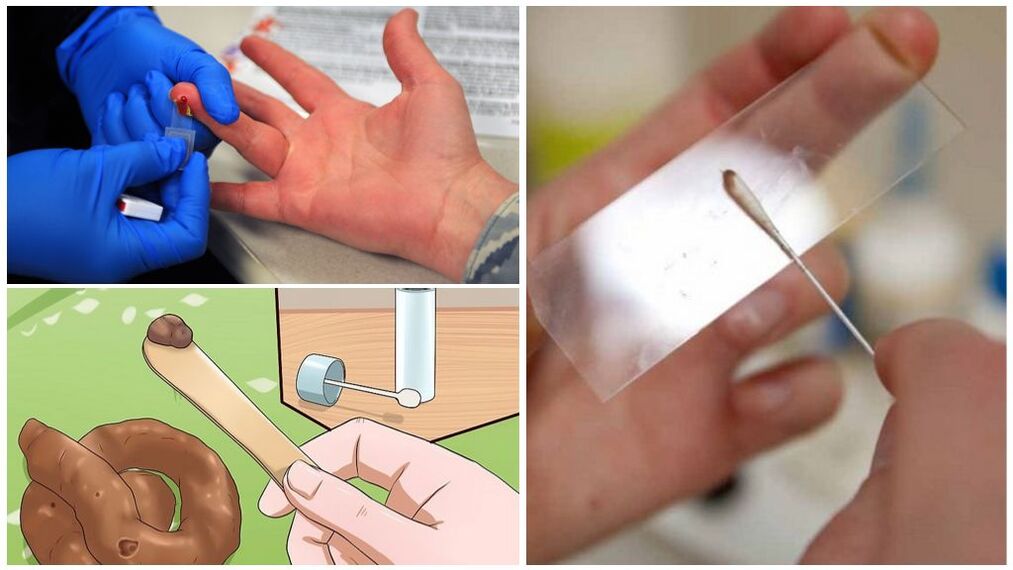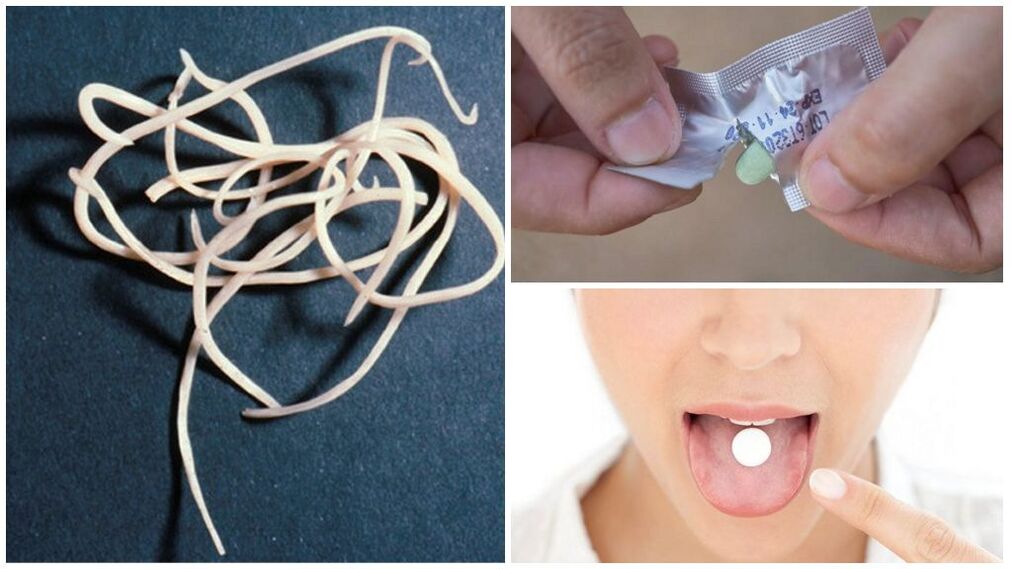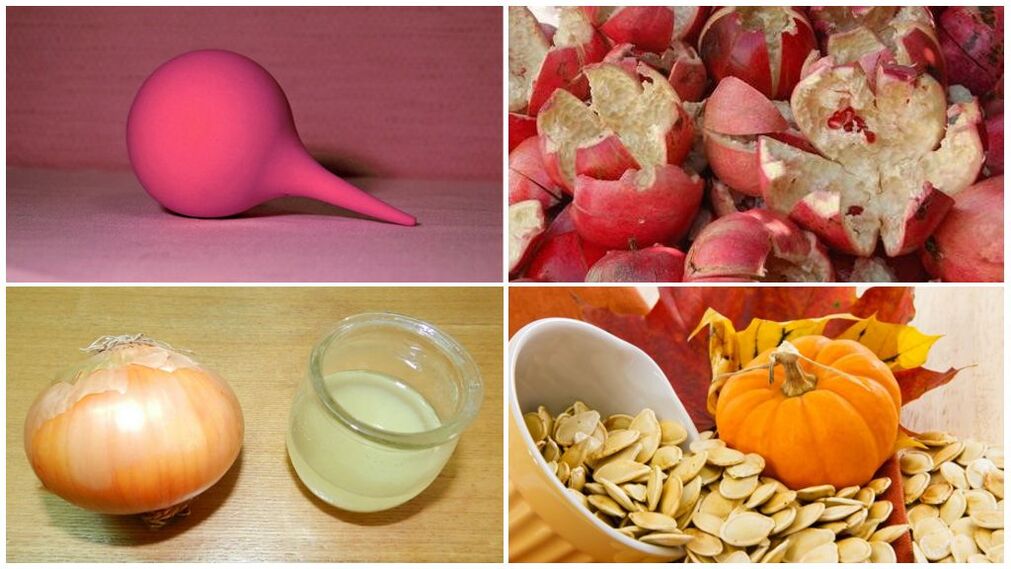Parasite infestations often go unnoticed. And the first symptoms of worm disease in humans are not specific, so the patient does not go to the doctor for a long time. As a result, the person may think they are overworked, have gastritis or poisoning, or have an acute flare of an allergy or arthritis.
How to suspect the appearance of worms
Signs of helminths in the body depend on the type and location of the parasite. Some symptoms appear soon after infection. Others occur after a while and indicate the movement of worms in the body, increased intoxication, lack of nutrients or vitamins.
The most common signs of worm disease in adults include:
- Increase body temperature. Fever may not manifest - up to 37. 5 ° C, for short periods of time. The episodes of temperature rise coincide with periods of decline, accompanied by an increase in different groups of lymph nodes.
- One of the most common signs of the presence of helminths is abdominal pain. Discomfort has a specific location - in the navel, liver or movement. Pain is accompanied by a violation of the stool, the appearance of impurities in the stool - mucus, blood. Frequent episodes of diarrhea, but with obstruction of the intestinal lumen by parasites, the development of obstruction can also occur.
- Anal itching is the first and characteristic symptom of pinworms. It occurs at night, forcing a person to scratch the anus.
- Worms cause allergic reactions in the skin or respiratory tract due to the circulation of their toxins and decay products in the body. So, a person complains of exacerbations of bronchial asthma, the appearance of dermatitis, eczema.
- When infected with worms, beriberi develops. It manifests itself in the form of worsening hair and nail conditions, characteristic "stuck" in the corners of the mouth, dry skin. Iron deficiency in the body will cause anemia, pale skin, and bruises under the eyes.
- Worms also have a pathogenic effect on the nervous system, resulting in patients suffering from headaches, irritability, impaired functioning, intermittent sleep, and emotional instability.
- Worms that travel through the respiratory tract (ringworm) cause a dry cough. With the movement of parasites in the muscles, the development of intoxication, the patient complains of pain, aching muscles and joints.

On a note!
The first symptoms of infection may appear within a few days after the worms enter the body of an adult. Usually they occur after 2-3 weeks from the time of exposure to the parasite, and with migrating worms - after many months, years.
The combination of different symptoms does not clearly indicate a specific disease, but is a reason to worry about your health and seek medical attention. If the sick person participates in the self-diagnosis process, seeking information on how to understand that you have a worm infection, they risk losing time and developing life-threatening complications.
What is the danger of parasitic infection?
Worms in the body not only deprive a person of essential nutrients and vitamins. Worms poison the patient with decay products, affecting internal organs. Parasitic human worms can lead to serious illnesses that require urgent surgery and, in some cases, partial removal of organs:
- acute intestinal obstruction;
- violation of the integrity of the intestine with the development of peritonitis;
- appendicitis;
- biliary obstruction;
- eye damage.
Importance!
Among the delayed consequences of invasion, leading to worsening of the condition, patient death, are cirrhosis and liver cancer, pneumonia, pleurisy, sclerosis of the lung tissue, myocarditis, peritonitis. brain, hearing and vision impairment, episy syndrome.
How does worm infestation happen?
To solve the problem of helminth control, it is necessary to have information about where the parasites come from. The most common modes of infection include: contact, household contact, percutaneous, transmission (associated with blood-sucking insects).

Here are the most typical cases where worms appear in the body:
- The use of vegetables, fruits, berries or greens contaminated with parasites.
- Eat undercooked meat and fish with helminth larvae. Veterinary unregulated feeding game. Therefore, Trichinella can withstand even prolonged stewing time and retain their viability.
- Violation of hygiene rules: official attitude of washing hands after returning home, contact with pets or street animals.
- Bathing in a reservoir of worm larvae.
- Contact with soil containing parasite larvae while working in the garden.
- Working in conditions with high risk of helminth infections: in groups of children, food, livestock, livestock.
Where are worms found in the human body?
There are many medical myths about where worms live in the human body. Not all of them are based on parasite data. Several species of helminths occupy different parts of the intestine and multiply in them. Humans can be the main host of the parasite. The so-called human worms undergo sexual reproduction in the body, then pass out in feces. In the case of animal helminths, a person is the intermediate host, in which only the asexual (reproduction) phase can occur. The parasite spreads to internal organs, causing damage to them. So, worms in the human body can be detected:
- subcutaneous;
- in the liver;
- in the bladder;
- In the eye;
- in muscles;
- in the lungs and heart;
- in the brain.
If we consider the description of the life cycle of the helminth in the form of a picture with an explanation, we can follow its movement through the body and guess what the main symptoms of the disease will be. .
Diagnosis of worms
The appearance of abdominal pain, fever, skin rash, cough with sputum, inflammatory and allergic changes on blood imaging is the basis for checking a person for parasites. Epidemiologists recommend laboratory tests to detect the helminth or an immune response to its presence in the body.

The following methods help identify worms in humans:
- stool analysis for eggs of parasites;
- scraping or smearing the gut microbiome;
- immunoassay to detect antibodies to helminths;
- PCR analysis of worm DNA fragments;
- detect worms in the duodenal lumen, take tissue biopsy samples.
These methods will help find the type of parasite and choose an effective drug. If internal organs are damaged, the following will help diagnose helminthiasis:
- X-ray of the lungs;
- Ultrasound of the liver, heart, pancreas;
- cystoscopy;
- Brain MRI.
If necessary, the infectious disease specialist will refer a neurologist, ophthalmologist, cardiologist, urologist for consultation.
On a note!
You should not try to identify helminths on your own, use the "unique computer diagnostic method" outside of a medical facility. This will lead to loss of time, reduced health.
Treatment of worms in humans
If the disease is detected, the infectious disease specialist will give full recommendations on disease treatment, regimen, and diet. If necessary, the doctor will recommend hospitalization at the hospital. There is no single "magic" drug for worms, and the symptoms and treatment of helminthiasis in adults can vary.
You need to know the basic principles of parasitology:
- To combat worms, drugs are used. The choice of treatment regimen (dose, duration of treatment, frequency of medication) depends on the type of helminth and the patient's physical condition.
- In severe cases, supportive services are provided in the hospital.
- You should not reduce the dose independently, reduce the duration of treatment with tablets or suspension from worms.
- Some drugs require a diet, no alcohol.
- There is no "miracle" remedy that allows you to quickly get rid of any worms in 1 day. For the treatment of certain types of human worms, short courses are indeed used, but it is not possible to destroy all the parasites in the body with a single pill, tincture or ointment.
- Herbal preparations are used for people whose diseases, for health reasons, are contraindicated to drugs in the form of tablets or suspension.
- Antiallergic, hepatoprotective, enteric sorbent, immunomodulatory drugs are prescribed as adjuvant therapy. By themselves, they do not help deworming a person, but improve a person's general health, eliminate unpleasant symptoms of the disease and side effects of treatment.

Importance!
Folk remedies are used only as an adjuvant treatment. Independent use of alternative medicines will lead to a worsening of the condition.
Pharmacy Fund
Treatment with drugs belonging to the group of anthelmintics helps to destroy and expel the parasites from the body. Pharmaceutical drugs have different points of application:
- disrupts the absorption of nutrients by the parasite;
- disturbs the metabolism of worms;
- causes paralysis of the muscular system due to helminths.
On a note!
With proper use and prevention of helminthiasis in the future, antihelminthic remedies actually help to permanently eliminate the parasites that have settled in the intestines and internal organs in humans. But if the patient ignores the basic rules of hygiene, reinfection with parasites is possible.
In addition, an infectious disease specialist can prescribe herbal remedies to help detoxify and repel worms in humans. Your doctor will recommend several herbs, based on information about your body's condition and the type of parasite. To cure sick people apply: pumpkin seeds, squid grass and honeysuckle.
Folk remedies for worms
Many patients reject traditional methods of treatment, hoping for the help of traditional medicine. Infection experts warn that home deworming with problematic solutions, infusions can lead to increased toxicity, allergic reactions. If you miss the time, the disease will get worse, possibly leading to death.

To expel helminths from the body, the following home remedies are widely used:
- onion broth;
- pomegranate peel;
- enema and eating pumpkin seeds;
- unsweetened sour vegetable and fruit juices;
- garlic with milk;
- soda enema;
- mugwort tincture.
Treatment evaluation
Before starting a course of treatment, the patient considers the different options for dealing with the parasites, trying to understand how to properly destroy the helminths. In their reviews, people who have had helminth infestations describe traditional drug therapy as quite effective. It is rare to get rid of helminths by folk remedies.
- "I started to worry about anal itching. Sent to a therapist, received instructions on how to shave. Very upset to find pinworms in scratch. I've read how dangerous it is. of helminths and decided not to poison herself by buying medicine on her own. On the advice of the doctor, she took a dewormer - 1 tablet once a week. The treatment took place for 2 weeks, I immediately felt better, I believe it was not such a terrible infection, but the medicine worked "absolutely well. "
- "I got worms after eating fish at a party. It wasn't long before the diarrhea started. I lost weight, my skin was dry and itchy. I researched in detail the information on how to treat parasites and how to get rid of them. After recovering my body, I started taking deworming medicine by myself. I was embarrassed to go to the doctor. Medicine did not help. I tried to fight the worms by folk methods: washing the liver with bitter, drinking milk. with garlic and enema But it didn't get better I had to turn to an infectious disease specialist, I was being treated with an anthelmintic from the benzimidazole group While "ripe" to see a doctor. , I lost 4 kg, pale, nervous ".
Prevent
Knowing how worms appear in the body, anyone can protect themselves and their loved ones from infection. Prevention includes:
- Wash hands with soap after contact with animals, when returning home.
- Periodic deworming of pets.
- Change bed linen promptly.
- Regularly wet, air, and clean carpets and upholstered furniture.
- Eating meat that has passed veterinary control.
- Thorough heat treatment of meat and fish.
- Do not eat raw meat, fish or organs.
Helminth infections require immediate treatment. You should pay attention to symptoms such as: diarrhea, abdominal pain, loss of appetite, weight loss, skin rash, cough, fever and see a specialist immediately. After treatment, precautions should be taken to prevent reinfection.
















































